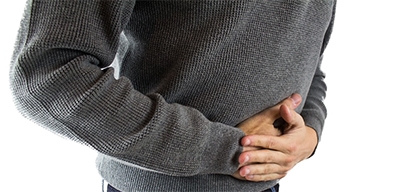Peptic ulcers
A burning sensation
| Download this episode | That burning sensation you’re feeling right now might be more than just the remnants of last night’s Thanksgiving leftovers or the result of a stressful drive into work. A peptic ulcer is an open sore that develops on the inside lining of the esophagus, stomach and the upper portion of the small intestine, also known as the duodenum. More than four million Americans currently suffer from peptic ulcer disease. Peptic ulcers happen when the acids that help us digest food damage the walls of the stomach or the duodenum. Normally, the lining of the stomach and small intestines are protected against the irritating acids produced in the stomach. If this protective lining stops working correctly, and the lining breaks down, it results in inflammation known as gastritis or an ulcer. Most ulcers occur in the first layer of the inner lining. A hole that goes all the way through the stomach or duodenum is a perforation, which is a very serious medical emergency. | A peptic ulcer occurs when acid in the digestive tract begins to eat away at the inner surface of the esophagus, stomach or small intestine, causing a painful sore that can bleed. A common cause of ulcers is the corkscrew-shaped bacterium called Helicobacter pylori. H. pylori bacteria commonly live and multiply within the mucous layer that covers and protects tissues that line the stomach and small intestine. Often, H. pylori causes no problems but sometimes it can disrupt the mucous layer and inflame the lining of the stomach or duodenum, producing an ulcer. H. pylori may be transmitted from person to person by close contact, such as kissing, or through food and water. Certain over-the-counter and prescription pain medications can irritate or inflame the lining of the stomach and small intestine. Other prescription medicines that can also lead to ulcers include the medications called bisphosphonates that are used to treat osteoporosis. | While stress itself is not a cause of a peptic ulcer, it can be a contributing factor. An emotionally disturbing circumstance or event, surgery or some kind of physical trauma, like a severe burn or injury, all of these can increase your risk of a peptic ulcer. And so can smoking and consuming alcohol, which can irritate and erode the mucous lining of your stomach, and it increases the amount of stomach acid that’s produced. Neither antacids nor milk can heal peptic ulcers, although each may make you feel better briefly. Some of the antibiotics used for H. pylori infection may not work as well if you take antacids. And while antacids may make ulcer pain go away for a while, they won’t kill the H. pylori germ. Only antibiotics can do that. Many people used to think that drinking milk helped peptic ulcers heal. But doctors know now that while milk may make ulcers feel better briefly, it also increases stomach acid and too much stomach acid can make ulcers worse. | Many people with ulcers have no symptoms at all. And, not all pain in the abdomen is considered an “ulcer.” The most important symptoms that ulcers cause are bleeding and pain. Bleeding from an ulcer can be slow and go unnoticed or can cause a life-threatening hemorrhage. Ulcers that bleed slowly might not produce the symptoms until the person becomes anemic. Symptoms of anemia include fatigue, shortness of breath with exercise and pale skin color. Bleeding that occurs more rapidly might show up as melena, a jet black, very sticky stool, or even a large amount of dark blood in the stool. People with bleeding ulcers may also vomit. The vomit may be red blood or may look like coffee grounds. Other symptoms might include passing out or feeling lightheaded. Symptoms of rapid bleeding represent a medical emergency. If this occurs, immediate attention is needed. People with these symptoms should dial 911 or go to the nearest emergency room. | Treating a peptic ulcer usually involves antibiotics to kill the H. pylori bacterium and other medications to reduce the level of acid in the digestive system to relieve pain and encourage healing. The patient may be required to take antibiotics for two weeks and acid-reducing medications for about two months. Proton pump inhibitors reduce acid by blocking the action of the parts of cells that produce acid. Long-term use of proton pump inhibitors, particularly at high doses, may increase your risk of hip, wrist and spine fracture. These forms of treatment can successfully heal an ulcer but if your symptoms are severe or if they continue despite treatment, your doctor may recommend an endoscopy to rule out other possible causes of your symptoms. If an ulcer is detected during endoscopy, your doctor may recommend another endoscopy after treatment to make sure your ulcer has healed. Ask your doctor whether you should undergo follow-up tests after your treatment.
Transcript
Caused by bacteria
Transcript
Stress and smoking
Transcript
No symptoms at all
Transcript
Reducing the acid
Transcript
